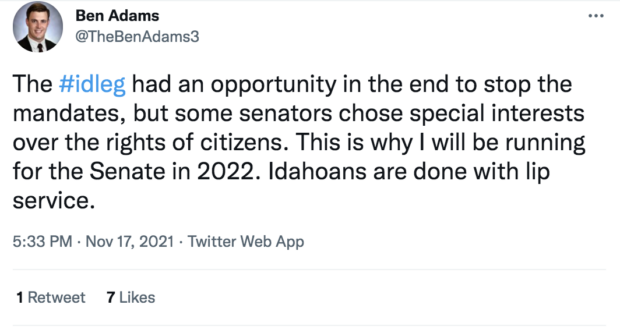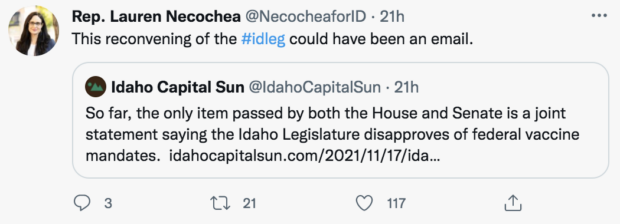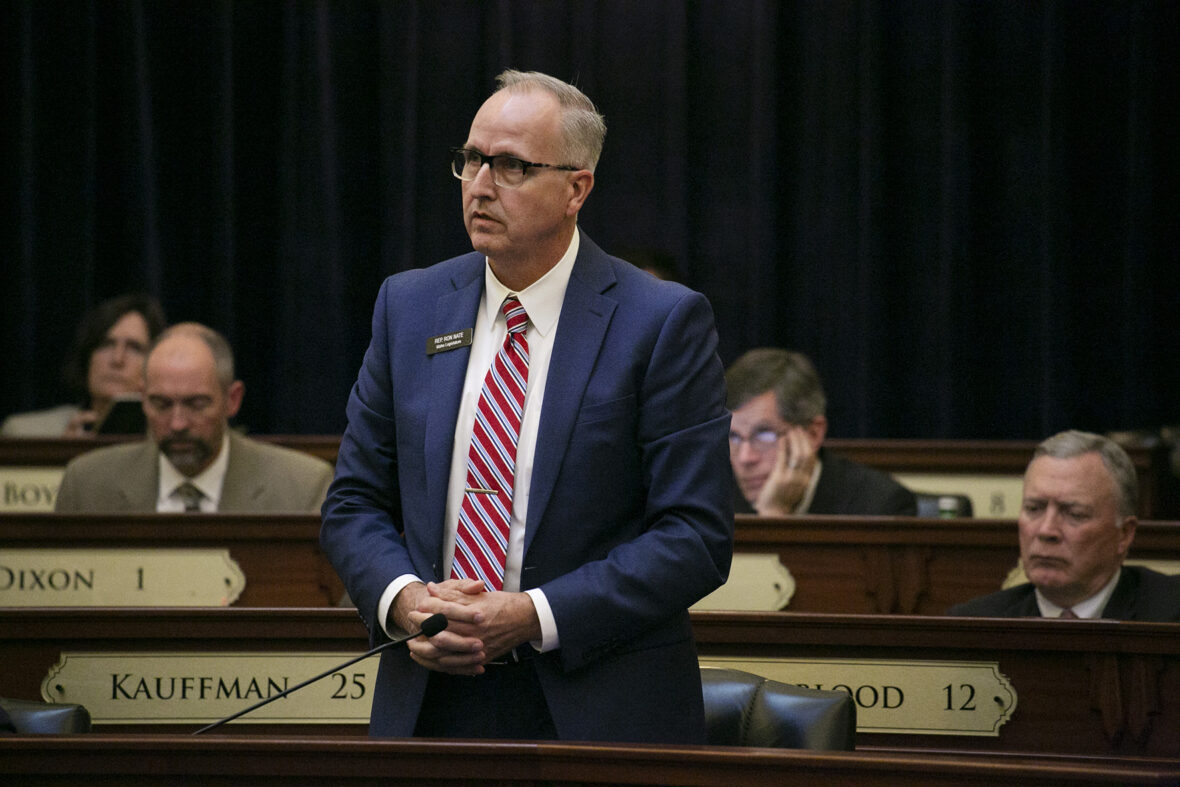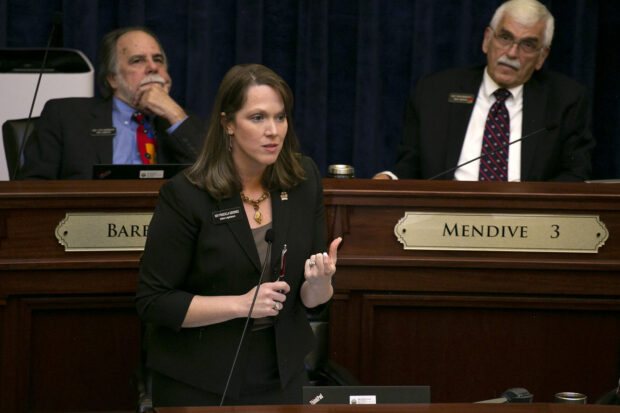In their fiscal note — those often woefully inaccurate cost estimates lawmakers are required to attached to their proposals — the authors of Senate Joint Memorial 105 told only part of the story.
Senate President Pro Tem Chuck Winder and GOP Caucus Chair Mark Harris said this of the nonbinding measure: “This memorial has no fiscal impact beyond postage to notify the Biden administration that the Idaho Legislature opposes the federal mandates.”
 Well, yeah, except the Legislature was in town for three days this week, at a taxpayer cost of $30,000 or so a day. Lawmakers left after passing only one item: the joint memorial, essentially a nastygram to the White House.
Well, yeah, except the Legislature was in town for three days this week, at a taxpayer cost of $30,000 or so a day. Lawmakers left after passing only one item: the joint memorial, essentially a nastygram to the White House.
No wonder some conservative Republicans took to social media Wednesday night to call the week a waste of time. No wonder some Democrats threw shade at Republican leadership for calling the Legislature back into town in the first place.
After 311 days, the long and record-shattering 2021 session limped to an anticlimactic conclusion Wednesday afternoon. Meanwhile, the 2022 session began.
During the pandemic, days and weeks have had this way of bleeding together. Why should legislative sessions be any different?
Everything Idahoans saw this week they will see again, in 53 days, when lawmakers return to the Statehouse.
 That certainly goes for policy.
That certainly goes for policy.
Legislative leaders wanted to focus on measures addressing vaccine mandates — even though the state has signed onto three federal lawsuits addressing those same mandates. Several of the three dozen bills proposed this week strayed into more far-reaching coronavirus policy: allowing adults to opt their kids (or themselves) from school health safeguards; banning local mask mandates, including at the school level; spending millions of federal coronavirus aid dollars on teacher bonuses and a sick leave bank for school employees, among other items.
Expect many or all of those bills back in 2022. “And there’ll be time to actually deal with them properly,” Winder, R-Boise, said after Wednesday’s adjournment.
House Minority Leader Ilana Rubel is expecting more of the same in 2022 — namely, another round of bills that will restrict what schools and other public entities can do to protect community health. “I think many of these bills will be similarly problematic when they come back,” said Rubel, D-Boise.
The 2022 session won’t only be about pandemic protocols. Lawmakers will have to figure out what to do with an ever-growing surplus, now estimated at $1.6 billion. Look for a round of election-year proposals to cut taxes. School academic standards will be up for review and renewal. But if there is one takeaway from this week, it’s the fact that, nearly two years into a pandemic, there is a lot of pent-up desire to legislate about the pandemic.
Not that lawmakers actually agree about the pandemic, of course. Tuesday’s hour-long floor debate on House Bill 429, the proposal allowing opt-outs from school health protocols, powerfully illustrated how the Legislature (and really, how the nation) is divided on COVID-19.
Downplaying the risk of COVID-19 for kids, conservative Republicans said it is time to let kids interact face-to-face, and stop forcing them to wear a mask in order to learn in the classroom. “Kids will do a lot of things to go to school,” said Rep. Ron Nate, R-Rexburg, the bill’s sponsor. “Requiring masks is harmful.”

Arguing against Nate’s bill — and arguing for allowing schools to take appropriate safety measures — House Assistant Minority Leader Lauren Necochea painted a different picture. The wife of a doctor, Nocochea said she has heard too many horror stories about a virus that too many of her colleagues are quick to trivialize. “We live in two different realities,” said Necochea, D-Boise.
She’s right.
And in less than eight weeks, 105 lawmakers will return to govern from those two different realities.
And the pandemic isn’t the only thing that divides this Legislature. Politics and group dynamics do that as well.
Once again this week, Idahoans saw the Statehouse schism between the House and the Senate: between a House that was itching to pass far-reaching and quickly passed proposals such as HB 429, and a Senate that wasn’t in any hurry to do anything more than fire off a letter to President Biden.
After the adjournment, House Speaker Scott Bedke emphasized the need for the houses to do a better job of communicating and collaborating. And despite “disgruntlement” over this week’s outcome, the Oakley Republican downplayed the divide between the House and Senate. Maybe. But by all appearances, the houses still appear separated by much more than the Statehouse’s rotunda, and that’s unlikely to change during the holiday hiatus.
And the ideological divide within the House couldn’t be more clear, either.

It started Monday with the one most substantive action of the week, and something the House had to address during this protracted 2021 session: the censure of Rep. Priscilla Giddings, R-White Bird, who played a role in outing “Jane Doe,” the Statehouse intern who has accused former Rep. Aaron von Ehlinger of rape.
In defending Giddings — and her decision to share an article identifying Jane Doe — her conservative allies went after Bedke. At one point, Nate said Bedke should not preside over the ethics debate, since Bedke and Giddings are both candidates for lieutenant governor.
Bedke didn’t budge.
“That’s just going to be the fact of your life going forward,” Bedke told Nate.
Another fact of life in this House divided: When it came time to adjourn for the year, and admit that any run at policymaking is simply going to have to wait until the new year, the House couldn’t even do that easily. After conservatives requested a recorded roll call, the House voted 37-24 to adjourn. Twelve of those 24 dissenting votes came from lawmakers who sponsored bills for the Legislature to consider this week — bills that, of course, didn’t pass.
In 2021, anyway.
But for all practical purposes, 2022 is already here.
Each week, Kevin Richert writes an analysis on education policy and education politics. Look for his stories each Thursday.
